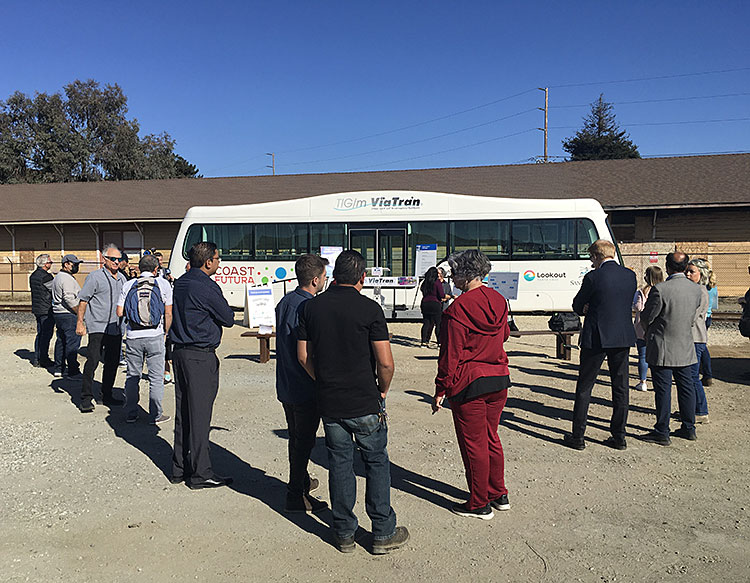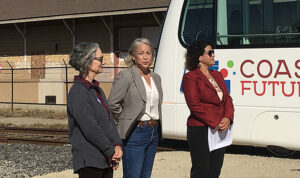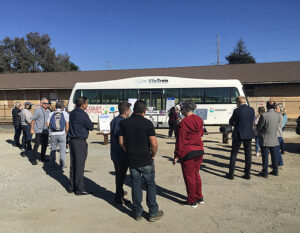Editor’s note: Roaring Camp took over Watsonville freight service in May, serving customers Martinelli’s, the apple-juice maker, and Big Creek Lumber. There is no freight service on the Felton to Santa Cruz section of the rail line, only tourist service.
•••
On Jan. 19, Roaring Camp — operator of the Santa Cruz, Big Trees & Pacific Railway (from Felton to Santa Cruz) — issued a statement calling on the Santa Cruz County Regional Transportation Commission to reject, at its Feb. 3 meeting, a proposal by RTC staff that Roaring Camp contends would force abandonment of the Felton Branch Rail Line.
RTC spokeswoman Shannon Munz responded with this statement the week of Jan. 26: “The Santa Cruz County Regional Transportation Commission will receive a report during the public session of the Commission’s Feb. 3 meeting related to a potential adverse abandonment action for freight service only on the Felton Branch Line and the relationship of that action to the potential for future railbanking of a portion of the Santa Cruz Branch Rail Line north of Watsonville.”
To view the Feb. 3 meeting online, visit sccrtc.org. The agenda was not posted on Jan. 19 or 20. Typically, the agenda is posted 3 days before a meeting. To make a comment, email [email protected]
Loss of the right to freight use would have a highly negative impact on Roaring Camp’s business, the company maintains.
Roaring Camp has more than 60 permanent employees.
Roaring Camp CEO Melani Clark provided this statement:
“Roaring Camp is strongly opposed to the RTC’s proposed action to pursue forced abandonment of the rail line we’ve owned and operated since 1984 because doing so will seriously harm our local, family-run, women-owned business, and our local economy. The RTC’s proposal represents an aggressive attack on our railroad and rail transportation in our county, fueled by special interests that are lobbying hard to end rail in Santa Cruz County. We encourage our community to join Roaring Camp in standing up against this poorly conceived, shortsighted move.”
Roaring Camp, incorporated in 1958, offers tourist trains on the Felton branch line, which it owns, has a contract with Progressive Rail to provide freight service on Santa Cruz branch line in Watsonville. Progressive Rail intended to stop service.
Most of that 32-mile line — bought by the RTC in 2011 for $14 million, including $11 million in voter-approved funds — has been inactive. A 1.2-mile trail for pedestrians and cyclists was installed next to the track in Santa Cruz for $6.4 million.
Roaring Camp contends South County is seeing growth in multiple local industries but RTC failure to repair two rail line bridges is preventing freight service in areas north of Watsonville, thus hampering economic growth and expansion of jobs.
Roaring Camp also contends the RTC plans threaten its tourist trains, which carry 200,000 guests a year pre-pandemic, helping fill local hotels and taking 9,000 beach visitors’ cars off the road.
In Roaring Camp’s view, Roaring Camp’s rail line would be the first domino to fall in a series of moves that would conclude with abandonment of entire 32-mile Santa Cruz Branch Rail Line, which would end any possibility of passenger rail service for Santa Cruz County.
The railroad operator calls this “potential aggressive action,” which should be “a major wake-up call for anyone who is interested in a future that includes both a rail and a trail system for our county. This isn’t just about Roaring Camp. It’s about our entire community and our future.”
RTC Says
Munz, the RTC spokeswoman, said the agency has been negotiating with Roaring Camp about railbanking the sections of the rail north of Watsonville, which would save the RTC $50 million to $65 million in repair costs so as to focus on building a bicycle and pedestrian trail next to rail line.
Roaring Camp has indicated that it will oppose railbanking the Santa Cruz Branch Rail Line, according to Munz.
Munz said the RTC has offered Roaring Camp a long-term license on the RTC-owned branch line, which would permit continued Roaring Camp recreational rail service to the Boardwalk and potential new recreational service to Davenport.
She said the RTC has also offered financial considerations if Roaring Camp’s equipment needs to be to be delivered by truck.
Railbanking is a method by which federally regulated freight rail lines proposed for abandonment can be preserved for future re-activation of freight service through interim conversion to trail use.
Filing the adverse abandonment action for the Felton Branch Line would provide clarity on whether the RTC might be able to railbank the Santa Cruz Branch Rail Line, according to Munz.
She contends railbanking would ensure the RTC’s property rights to use the railroad easements for the construction of trail segments without the potential need to purchase additional property rights.
Munz said the RTC has not taken any action to approve filing an adverse abandonment application, which is what Roaring Camp is referring to.
If the RTC were to authorize filing of an adverse abandonment action, Munz said, the RTC would ask the federal Surface Transportation Board to order the abandonment of only federally regulated freight services on the Felton Branch Line.
She contends Roaring Camp would be able to continue its passenger tourist service on the Felton line and could potentially also continue the same type of service on a portion of the Santa Cruz Branch Rail Line upon entering into a mutually acceptable agreement with the RTC.
Guy Preston, RTC executive director, said, “The Commission would prefer to reach an agreement with Roaring Camp to not oppose railbanking, but to date we have been unsuccessful in negotiations. Adverse abandonment of the Felton Branch Line is a potential procedural action toward accomplishing railbanking of the Santa Cruz Branch Rail Line, in the event an agreement cannot be reached.”
He added, “We have a lot of respect for Roaring Camp. They are a valuable asset to the Santa Cruz County community, and we want to ensure that they continue to have a successful business for the long term.”



